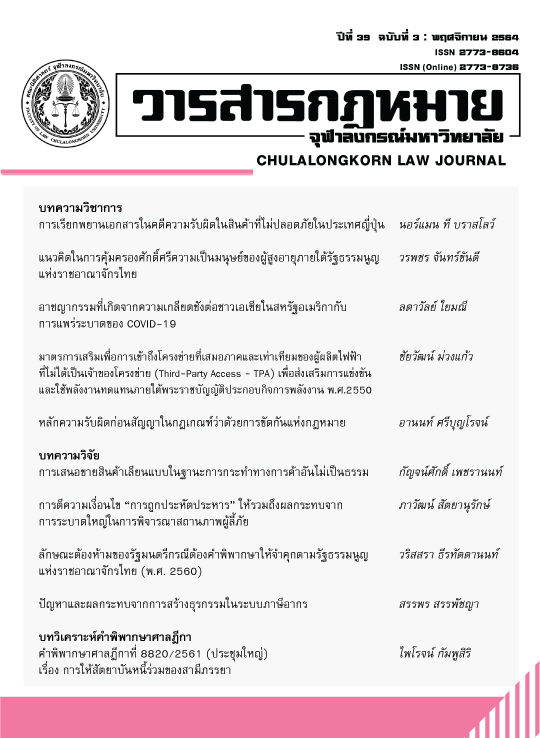การเสนอขายสินค้าเลียนแบบในฐานะการกระทำทางการค้าอันไม่เป็นธรรม
Main Article Content
บทคัดย่อ
การเสนอขายสินค้าเลียนแบบเป็นการกระทำทางการค้าที่สามารถพบได้ในชีวิตประจำวัน ในหลายกรณีการกระทำทางการค้าดังกล่าวทำให้ผู้ซื้อถูกหลอกลวงในแหล่งที่มาของสินค้า ในบางกรณีการเสนอขายสินค้าเลียนแบบอาจเป็นการใช้ประโยชน์จากความนิยมของผู้ผลิตสินค้าต้นแบบอย่างไม่เหมาะสม หรือเป็นการทำลายความนิยมของสินค้าต้นแบบอย่างไม่เหมาะสม ในบางโอกาสการเสนอขายสินค้าเลียนแบบยังมีความเชื่อมโยงกับการได้ข้อมูลสำคัญที่ใช้ในการผลิตสินค้าเลียนแบบมาโดยมิชอบอีกด้วย การเสนอขายสินค้าเลียนแบบในกรณีตามที่กล่าวมาเหล่านั้นล้วนแต่ก่อให้เกิดความเสียหายแก่ผู้ผลิตสินค้าต้นแบบทั้งสิ้น กระนั้นเอง การกระทำทางการค้าดังกล่าวอาจไม่ได้เข้าข่ายเป็นการละเมิดทรัพย์สินทางปัญญาด้วยเหตุผลบางประการ เช่น การหมดอายุความคุ้มครองตามกฎหมายทรัพย์สินทางปัญญาของสินค้าต้นแบบ เป็นต้น จึงเป็นที่มาสู่ปัญหาว่า จะมีกลไกทางกฎหมายอื่นใดที่จะช่วยป้องกันและชดใช้ความเสียหายในกรณีดังกล่าวได้บ้างหรือไม่
วิจัยซึ่งเป็นรากฐานของบทความวิจัยฉบับนี้เสนอว่า มาตรา 57 พระราชบัญญัติการแข่งขันทางการค้า พ.ศ. 2560 ซึ่งเป็นบทบัญญัติที่ว่าด้วยการห้ามการกระทำทางการค้าอันไม่เป็นธรรมนั้น สามารถนำมาใช้ป้องกันการเสนอขายสินค้าเลียนแบบในพฤติการณ์ดังที่กล่าวไว้ข้างต้นได้ ทั้งนี้ ในวิจัยฉบับดังกล่าวได้นำเสนอแนวทางในการปรับใช้มาตรา 57 พระราชบัญญัติการแข่งขันทางการค้า พ.ศ. 2560 กับการกระทำทางการค้าดังกล่าว รวมทั้งเสนอแนะแนวทางในการแก้ไขเพิ่มเติมพระราชบัญญัติการแข่งขันทางการค้า พ.ศ. 2560 เพื่อให้สามารถต่อต้านการกระทำทางการค้าเช่นว่าได้อย่างเหมาะสม
Article Details
ลิขสิทธิ์และเนื้อหาในเว็บไซต์ของวารสารกฎหมาย (รวมถึง โดยไม่จำกัดเฉพาะ เนื้อหา รหัสคอมพิวเตอร์ งานศิลป์ ภาพถ่าย รูปภาพ ดนตรีกรรม โสตทัศนวัสดุ) เป็นกรรมสิทธิ์ของวารสารกฎหมาย และผู้ได้รับการโอนสิทธิทุกราย
1. วารสารกฎหมาย ให้อนุญาตให้คุณใช้สิทธิอันไม่เฉพาะเจาะจงที่สามารถถูกถอนเมื่อใดก็ได้ โดยไม่มีค่าใช้จ่าย ในการ
- เยี่ยมชมเว็บไซต์และเอกสารในเว็บไซต์นี้ จากคอมพิวเตอร์หรือเครื่องมือสื่อสารผ่านเว็บบราวเซอร์
- คัดลอกและจัดเก็บเว็บไซต์และเอกสารในเว็บไซต์นี้บนลงคอมพิวเตอร์ของคุณผ่านระบบความจำ cache
- สั่งพิมพ์เอกสารจากเว็บไซต์นี้สำหรับการใช้ส่วนตัวของคุณ
- ผลงานที่ได้รับการตีพิมพ์โดยวารสารกฎหมาย จุฬาลงกรณ์มหาวิทยาลัย ถูกคุ้มครองภายใต้ Creative Commons Attribution 4.0 International License ซึ่งอนุญาตให้ทุกคนสามารถคัดลอก แจกจ่าย ดัดแปลง ส่งต่อ ผลงานได้ ก็ต่อเมื่อผลงานและแหล่งข้อมูลได้รับการอ้างอิงอย่างเหมาะสม
2. วารสารกฎหมาย จุฬาลงกรณ์มหาวิทยาลัย สงวนสิทธิ์ไม่อนุญาตให้คุณใช้สิทธิอื่นใดที่เกี่ยวข้องกับเว็บไซต์และเอกสารบนเว็บไซต์นี้ เช่น การคัดลอก ดัดแปลง เปลี่ยนแปลง ส่งต่อ ตีพิมพ์ แจกจ่าย เผยแพร่ จัดแสดงในที่สาธารณะ ไม่ว่าจะในรูปแบบใดก็ตาม ซึ่งเว็บไซต์หรือเอกสารบนเว็บไซต์ โดยไม่อ้างอิงถึงแหล่งข้อมูลหรือโดยไม่ได้รับอนุญาตเป็นลายลักษณ์อักษรจากวารสารกฎหมาย จุฬาลงกรณ์มหาวิทยาลัย
3. คุณอาจขออนุญาตที่จะใช้เอกสารอันมีลิขสิทธิ์บนเว็บไซต์นี้โดยการเขียนอีเมลล์มายัง journal@law.chula.ac.th
4. วารสารกฎหมาย จุฬาลงกรณ์มหาวิทยาลัย เข้มงวดกับการคุ้มครองลิขสิทธิ์อย่างมาก หากวารสารกฎหมาย จุฬาลงกรณ์มหาวิทยาลัยพบว่าคุณได้ใช้เอกสารอันมีลิขสิทธิ์บนเว็บไซต์นี้โดยไม่ถูกต้องตามการอนุญาตให้ใช้สิทธิ ดังที่กล่าวไปข้างต้น วารสารกฎหมาย จุฬาลงกรณ์มหาวิทยาลัยอาจดำเนินคดีตามกฎหมายต่อคุณได้ เพื่อเรียกร้องค่าเสียหายที่เป็นตัวเงินและคำขอชั่วคราวให้คุณหยุดการใช้เอกสารดังกล่าว ทั้งนี้ คุณอาจถูกสั่งให้ชดใช้ค่าใช้จ่ายใดๆ ที่เกี่ยวข้องกับการดำเนินการตามกฎหมายนี้
หากคุณพบเห็นการใช้เอกสารอันมีลิขสิทธิ์ของวารสารกฎหมาย จุฬาลงกรณ์มหาวิทยาลัย ที่ขัดหรืออาจขัดต่อการอนุญาตให้ใช้สิทธิดังที่ได้กล่าวไปข้างต้น โดยเชื่อว่าได้ละเมิดลิขสิทธิ์ของคุณหรือของผู้อื่น สามารถร้องเรียนมาได้ที่ journal@law.chula.ac.th


